| |
Once There Was a Small Shtetl Named Lunna
by Ruth Marcus
In August 2006, I accompanied Eliezer Eisenshmidt, his granddaughter
Liat and Mira Feingold (her father Aba Margalit was born and grew up
in Lunna) on a visit to Lunna. Impressions and reflections of this
visit, together with selected photos, are presented in the
article which can be accessed via the link:
https://www.jewishgen.org/Belarus/newsletters/grodno/Lunna/index.html
More pictures from the visit to Lunna are shown below (©2006, Ruth
Marcus)
|
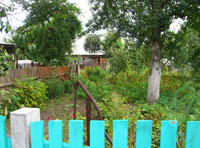
|
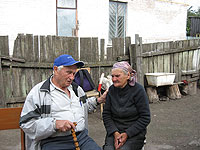
|
|
|
Here was the backyard of Eisenshmidt’s family, Wolpianska (Sovietskaya) Street
|
|
|
In the backyard of Eisenshmidt's old neighbor, Wolpianska (Sovietskaya) Street |
|
|
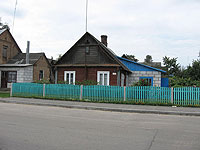
|
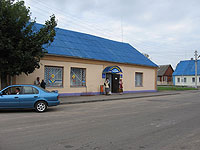
|
|
|
Here was the house of Baska Becker, Wolpianska (Sovietskaya) street
|
|
|
Here was the residence of Feivel Yedwab, now the town supermarket. |
|
|
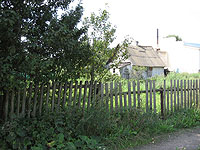
|
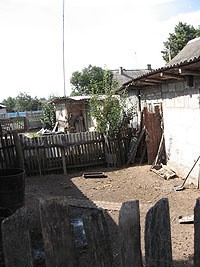
|
|
|
Proletarskaya Street
Here were the residences of Simon Alperstein,
the Shochet; Werebejczyk, the Baker; Gerszon Gisser, the Butcher
|
|
|
Proletarskaya Street |
|
|
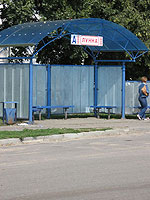
|
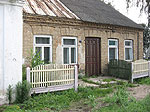
|
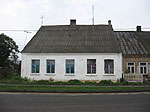 |
|
|
The bus station, Market Square, now called
the Heroes Square |
|
|
Here was the residence of Aaron Kosowski, facing Heroes Square
|
|
|
Here was the residence of Yehoshua
Eliashberg, Heroes Square |
|
|
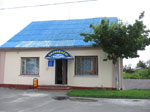
|
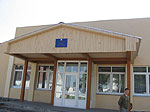
|
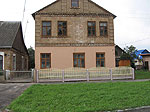
|
|
|
Here was the residence of Zlotoyabko family, Heroes square |
|
|
The "old" synagogue, now the town club, Heroes Square |
|
|
Here was the residence of Moshe-Yudel Arkin, Heroes Square |
|
|
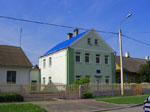
|
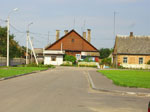
|
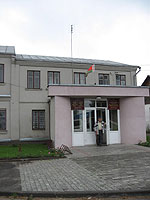
|
|
|
The two-story house was the residence of Berachowicz family, Heroes Square |
|
|
Here was the residence of Tzvi Eisenshmidt, Heroes Square |
|
|
The Town-Hall, Heroes Square |
|
|
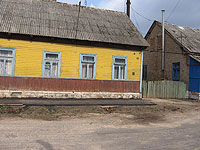
|
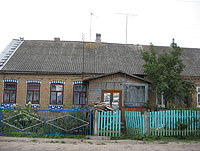
|
|
|
Here was the residence of Moshe Kosowski, Grodzienska Street
|
|
|
Here was the residence of Moshe Feinzilber, Grodzienska Street |
|
|
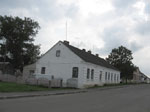
|
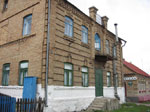
|
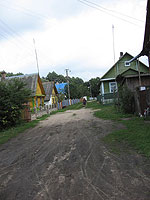
|
|
|
Here was the residence of Yedwab, Podolna
(Komsomolskaya) Street. On June 22, 1941, about ten Jews were hiding
in the basement of Yedwab's house and were killed by the German
bombing
|
|
|
Here were the residences of Yehoshua Win (the house in front) and of
Mordechai Yevnin, Podolna (Komsomolskaya) Street |
|
|
general view of Komsomolskaya Street leading toward the Niemen River |
|
|
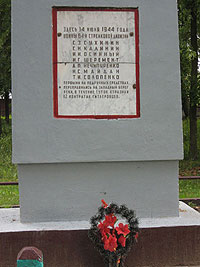
|
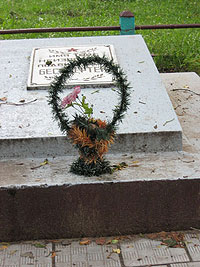
|
|
|
A memorial monument for the memory of seven Russian
soldiers from Brigade 64 who crossed the Niemen River to the bank of
Lunna in WW2 and were killed while defending the area against 12
attacks of the German army
|
|
|
A monument for the memory of the anonymous Russian soldier |
|
|
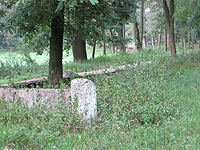
|
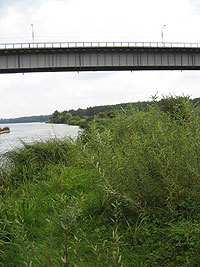
|
|
|
The old Lunna cemetery located in the forest on that area; almost all the tombstones there were destroyed
|
|
|
The new bridge over the Niemen River |
|
Our Visit to Lunna in 2006
by Mira Feingold
From the time I met Ruth Marcus I have known that a day will come when we
will visit the "shtetl" where my parents and Ruth's father were born.
They came to Eretz Israel in the early 1930s. They settled in Eretz
Israel and even managed to support their families who remained in
Lunna.
Both Ruthie and I were born in Israel. During my childhood I heard
many stories about Lunna. I heard about names of people, their
occupations, the landscape, the atmosphere in the shtetl and even its
individual smells.
When the day came and the sign "Lunna" appeared in front of my eyes I
became very excited. The car that took us from Grodno entered Lunna.
We saw the houses, some of bricks and other from wood. The market
square was empty. The church nearby was sparking with whiteness. From
the municipality building, there is a road leading to a monument
recently built, a memorial to those who were killed by the Nazis. We
got permission to put a memorial plaque in Hebrew writing for the
memory of the Jewish victims.
Dear Eliezer Eisenshmidt who escorted us, pointed at the houses where
our parents had lived. A young family living in my grandmother's house
was unfriendly, so I did not ask permission to come in. I observed
every plank of wood on the outside of the house and the fence. I tried
to picture my grandmother's entrance and exit from this little house.
My great-grandmother's house however was destroyed.
Eliezer continued pointing at the Jewish homes mentioning the names of
the Jews who had once lived there. On the roof of one house we saw a "Magen
David" symbol. Other houses had on top the year they were built.
Another house had the initials of the name of the Jewish owner. It is
silent evidence to Jewish presence.
We continued towards Zaleski Forest and the Niemen River, the places
of entertainment and rest for the local residents and their guests.
The river appeared in its glory. I felt my mother's footsteps
alongside me... I could not physically distance myself from this
place.
A major part of the visit in Lunna was spent at the Jewish cemetery.
Two years ago, a group of American students fenced the area, removed
the wild grass and tried to clean the gravestones and read the
inscriptions. Today, once again we found the cemetery overgrown and
neglected… Eliezer prayed "Kadish". There was nothing to do more.
Lunna the "shtetl" exists. The Jewish population has been erased.
Reflections From a Visit To Lunna
by Alex Gisser
The following are just some random, unrefined thoughts I shared a few
years ago, by e-mail, with Ruth Marcus …
In 2003, I went "solo" to Belarus, no tour group or anything… (I
obtained my visa for Belarus in Budapest – a long and amusing story in
itself). My hotel was pre-booked in Grodno for five nights but I did
not stay in Grodno all that time. In fact, on my second day in
Belarus, I visited Lunna for what I thought would be a day trip. I was
accompanied by a very nice Belorussian woman who grew up in Lunna and
whose father still lives there. (Her brother, I found out, lives near
Baltimore, Maryland). Before I knew it, it was sunset, and the last
bus back to Grodno had long since departed. The woman generously
invited me to spend the night at her father’s home. As it turned out,
I actually ended up staying (much to the chagrin of the Belorussian
authorities, who apparently were keeping tabs of my failure to return
to the hotel) in Lunna with this family for two nights and three full
days. The father (about 70 years old) lives on the top of the hill
behind the new school. The father had been a bookkeeper at the local
Lunna Kolchoz, and actually had grown up in one of the Belorussian
villages very close to Lunna. His family apparently moved the entire
house (literally) to Lunna a few decades back.
During my stay in Lunna I was able to chat, with the help of my
hostess, who speaks English, to many older residents. My hostess
seemed very interested and took many notes. In general, the persons I
spoke with appeared willing to answer my many questions about Jewish
Lunna.
None of the older locals seemed to remember my family, although some
vaguely remembered a "busy" butcher shop with more than one person
working in it. I had a fairly good idea where the meat shop may have
been, based on what my father had told me. I think it was right near
where the synagogue near the town- square was (the synagogue is gone
and now there is a club there). My dad told me that their house was a
two-story house across from the synagogue... I tried to enter the
house I assumed was my family's house, which is now a multi-family
dwelling, but no one let me in.
The older locals remembered the Wola Ghetto quite well, but the
younger townsfolk, including my hostess had never heard of Wola, let
alone the Ghetto. I recall that she diligently took notes, and even
sketched a small map during the three days I spent asking the older
residents as many questions as I could about the pre- and war periods
in Lunna. Among other things, I was told that the Jews were able to
move around well in the Wola Ghetto (or within Lunna itself? – which
does not seem, in fact to be the case), that they “ate well” and there
may have been some farm products available (no doubt at a very, very
extortionate price), since small town ghettoes were, at least
sometimes, better than the larger ones. One person told me that her
father had driven one of the horse-drawn carts (“telechki”) used to
carry the Jews in the early hours of November 2, 1942, the date of
their final deportation to the Kielbasin transit camp, 35 or so
kilometers away, near Grodno. Another pointed out the exact roads
along which the Jews were driven out of town. Yet another older
person, a Polish woman, as I recall, told me that her family had
offered a Jewish girl (who she said was her son’s girlfriend) on the
day of the deportation, to remain (presumably in hiding) with them,
but that the girl preferred to stay with her family as they were being
deported to Kielbasin. Whether this story is true or not we will never
know … One thing I noticed – not a single person I spoke to in Lunna
ever mentioned the word Auschwitz - it was always just that the Jews
were taken to Kielbasin. My guess is that many didn't want to know, or
care to know, of their Jewish neighbors’ ultimate fate.
My hosts told me a couple of other interesting things. Apparently a
number of locals in Lunna did fairly well after the Jews were driven
from their homes to the Wola Ghetto and even after the war - not only
did they get to live in the former Jewish houses, but to this day, at
least one family, I was told, owns a piano they "inherited" from a
Jewish family, and others have similar possessions ... Another
interesting thing - which was confirmed, in a way, by Mr. Aaron Welbel,
is that when the Russians occupied Lunna from 1939-1941, the Jews
would at times, in the town square, praise the Communist government
(obviously in relation to the prior anti-Semitic post-Pilsudski,
Rydz-Smigly, Polish nationalist Government) at rallies of sorts,
saying, "Lenin Hurrah, Stalin Hurrah!" and the like. Whether they
actually said this, I don't know. I do know from the Welbels that when
the Russians entered Lunna, as Mr. Welbel described it - "the
Moschiach (Messiah) has come, riding a red horse." ---
By the time I got up after my first night in Lunna, my hosts had
already been awake quite some time, had set the table and prepared one
of their many very generous meals for me. The father, I learned, had
gone out early in the morning, as I think he always does, and hobbled
down to the town square - he walks with a cane and a limp, and is not
really very mobile. The daughter told me she couldn't believe what her
father had just told her. Apparently the people in town were talking
about the American Jew who was staying with them who had come to take
back his property. On one of the three days I was in Lunna, I was also
told that some American who had left before the war had taken back his
building on the town square, or something like that, shortly before I
went to Lunna. The Poles, in particular, that I had met were very
nervous about me, saying that an American Jew had come to Lunna in
order to claim back his family's property. In this regard, as I
recall, one elderly Polish woman, at some point of our conversation,
rather inexplicitly broke off our chat, insisting forcefully (and for
no specific reason) that the dark, one-room hovel (I can’t describe it
any other way) where we were chatting belonged to her. With that, she
broke off the conversation and started rummaging, unfruitfully,
through an old wooden drawer for the paper she had received from the
government providing this. (The house, I believe, had once belonged to
a Jewish family). If I remember correctly, this woman responded, when
I asked her whether she missed the Jews of Lunna, fumbled a bit, then
responded hesitantly, and somewhat incoherently, something to this
effect: “Well yes, they would have let me stay in this house.”
That said, I cannot emphasize strongly enough that my Belorussian
hosts were very nice, and did not have any stereotypes, that I know
of. Other locals, particularly Poles, however, commented how the Jews
were rich and had “jewels and gold” (indeed, in Volpa, which is about
12 km from Lunna, where my grandmother was born, I noticed, when I
went to the cemetery, that many graves were dug up and there were
holes in the upended gravestones. When I asked why, I was told,
"Because the Jews were rich, and that’s where they hid their jewels
and gold."... )
Some Lunna locals - or mainly the Poles – told me that the Jews had
dug a tunnel from the old synagogue (now the club) all the way to the
Niemen River. It is very mysterious, and almost certainly an
apocryphal tale - but we have similar myths about American Indians in
the United States.
One local woman (perhaps the former mayor of Lunna or her colleague)
wrote down (in Cyrillic letters) several names of Jews from Lunna that
she or others knew about. Those names are: Korangold, Kogan, Yankel [Welbel]
and Kosowski - corn buyers; Rubinshtein - blacksmith; Isar - tailor;
Novick - bakery owner; Archick - cattle slaughterer; Fruma - fur shop
owner; Zlotoyabko - store owner; Barachowicz - cash desk; Zelick -
brick-works.
I must say, to me, Lunna seems so devoid of life and vibrancy now,
and, at least as I envision it, was so much more a vital town when
Jews lived there. Nevertheless, something rather unusual happened the
whole time I was there. I recall walking down the dirt path down to
the Niemen from Lunna, and I felt - literally - some type of vibration
- like when a rock is dropped in the water and it makes concentric
rings – I felt some type of energy, some type of presence, of Jews
remains in Lunna. On that path, I felt, and could almost see, Jews
walking those same steps down to the river, say, on a Saturday. That
is, it was my very real impression that there is still something
remaining - very psychically, if not physically – after all, 500 years
of presence doesn't completely disappear just like that. To my mind,
there are still ripples or energetic traces of the Jews of Lunna
there, and I felt it physically - it was amazing, and, as I have said,
this feeling really didn't leave me the whole time I was in Lunna (I
felt it, though much less so, in Volpa, as well.) I also have to say
that this feeling was not upsetting at all - in fact, I felt myself
very at home with it and I wanted to stay with this feeling the entire
time I was there. Of course, those energetic traces will eventually
disappear - probably this is similar to the American Indians (I grew
up on a major Indian battleground, but, because it was so many
hundreds of years ago, I (I can’t speak for others) don’t really feel
their presence anymore there).
Anyway, all I can really say is that this feeling was so strong that
you could almost touch it. It raises, a much broader philosophical
question, of course, and that is, what will we, as humans on earth
today, be leaving behind after we are gone from here? In Eastern
thought, I guess one could describe it as karmic energy; that is, if
karma is simply the law of cause and effect (I do something and it
will have an effect on something else...), then we cannot but help to
touch others and our environment by our actions… I am convinced that
Lunna still has (at least to me) a significant amount of Jewish
karma...
Below are three photographs taken in Lunna (©2003, Alex Gisser)
|
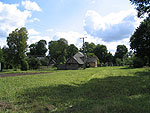
|
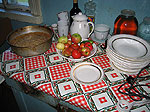
|
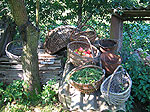
|
|
|
Lunna Scene |
|
|
My Hosts' Hospitality |
|
|
From my Hosts' Garden |
|
|
This site is hosted at no cost by JewishGen, Inc., the Home of Jewish
Genealogy. If you have been aided in your research by this site and
wish to further our mission of preserving our history for future
generations, your
JewishGen-erosity is greatly appreciated.
|
Compiled by
Ruth Marcus & Aliza Yonovsky Created
May 2007
Updated by rLb, March 2020
Copyright © 2007 Ruth Marcus
All the photos are presented
by courtesy of the families and are not allowed to be reproduced
without their permission. |
|
|